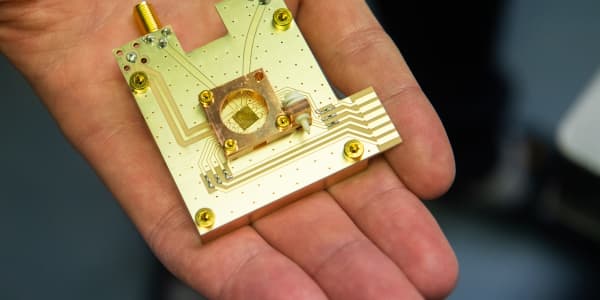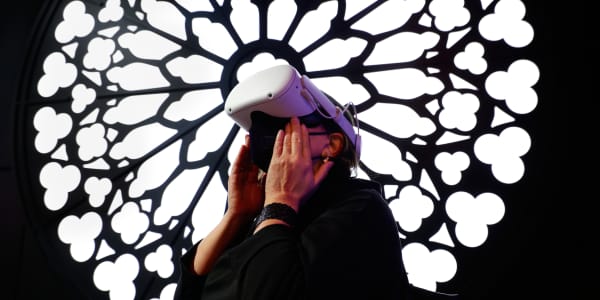
Singapore's government cannot create a Smart Nation alone, the head of the country's innovation agency told CNBC - it needed individuals, businesses and investors to throw themselves into the project.
Singapore's Smart Nation initiative, introduced in November 2014, aims to use technology to improve quality of life for its residents.
Steve Leonard, executive deputy chairman of the Infocomm Development Authority of Singapore (IDA), which oversees the Smart Nation program, told CNBC that Singapore needed to find new ways of using technology to deal with an aging population and increasing urban density, because of their outsize impact on health care, transportation and resources.
"Smart Nation is the framework that brings together scientists, engineers, artists, investors, academics, entrepreneurs and many others to tackle the big challenges we – and every country – face in improving the lives of people of all ages," he said.
Singapore has already made big strides toward creating an environment in which innovation could flourish.
Dell released a study in April that identified 50 global cities that used technology to provide tools for their people and business sectors to access in order to deliver improved performances.
The Dell study evaluated these "future-ready economies" on three criteria: having the right people with the right skill sets, having infrastructure that can support new technologies and providing opportunities for businesses to innovate and grow.
Singapore ranked third in the list of 50, behind the Californian cities of San Jose and San Francisco, but above the likes of London, Sydney and New York.
Creating a smart city-state
Amit Midha, president of Asia Pacific and Japan at Dell, told CNBC Singapore's number-three position was "a very proud moment."
He said that as it moved to a more digital-based economy, the city-state was ensuring it had the necessary skilled labor, technological infrastructure and commerce needed to become a future-ready city.
But Leonard said that for a country to successfully use technology to chart its future, the private sector's continued enthusiastic participation was vital.
"Government cannot - and does not intend to - attempt to solve all these [problems facing Singapore] alone," he said. While government could ensure there are laws and regulations in place to support innovation, "we need engaged industry, investors and individuals to use these ingredients to drive positive change," he added.
Leonard added that Singapore also wanted to ultimately "play an important role in creating some technologies for the future, not just purchase what was created somewhere else."
From smoking sensors to ultra-fast broadband
Singapore has already ensured that 95 percent of homes and businesses have access to the ultra-fast Next Generation Nationwide Broadband Network, widespread access to Wi-Fi in public places and nationwide access to mobile payment systems.
Meanwhile, so-called Aggregation Gateway (AG) boxes are part of the more futuristic tech infrastructure that is being put in place as part of the Smart Nation project.
The AG boxes - which are currently being built by the government in collaboration with the private sector and don't yet have a formal launch date - will provide connectivity to various sensors the country plans to deploy to measure everything from temperature and humidity to detecting people smoking in prohibited areas, as well as providing a single infrastructure to be used by multiple government agencies.
For example, at present if an agency such as the Land Transport Authority (LTA) needs to install cameras on a stretch of road, it must dig into the ground to access power cables. The whole process takes time, costs money and delays traffic. Once the AG boxes are in place, the LTA could connect to a power source and mount the cameras in a single step.
Another Smart Nation development is the virtual, 3D model of Singapore being built by the National Research Foundation, the Singapore Land Authority and IDA; it is expected to be ready by 2017 and will be used as a test-bed for city planning and service-provision by government agencies.
Meanwhile, the technology giant IBM has said it was working with the Agency for Science, Technology and Research's Institute for Infocomm Research to create tools for big data and analytics, cyber security and urban mobility for the Smart Nation initiative.
The search for talent
Having people who possess the right skills to use technology was also of vital importance, the experts said.
It's no accident that some cities do better than others in helping companies become successful, said Dell's Midha.
"You see most of the unicorns and extremely successful companies are within a 200-mile radius of a great university." A unicorn usually refers to a start-up that is valued at $1 billion or more. Stanford Unveristy, for example, was considered a feeder school for Silicon Valley's tech industry due to Stanford's record of creating entrepreneurial graduates, he noted.
In Singapore, universities were key to developing people and technological knowledge, according to Dr. Lily Chan, CEO at NUS Enterprise. She said National University of Singapore (NUS) had many programs designed to support entrepreneurship and research into future-proofing projects.
"NUS has seen more than 300 industry collaborations and partnerships, spun off more than 60 companies from the university's research and commercialized more than 350 technologies," said Chan, adding these spin-offs raised more than 200 million Singapore dollars ($145.65 million) in equity funding in 2015.
Huge potential for digital economies
Research suggests there is tremendous potential for economies that have technology as one of their core foundations.
A joint study by global management consultancy A.T. Kearney and Asian telecommunication company Axiata, released in February, showed that growing a digital economy could add $1 trillion to the gross domestic product of the Association of Southeast Asian Nations (ASEAN) bloc - of which, Singapore is a member - over the next 10 years.
The report said a robust economy, a literate and relatively young population and a well-developed information and communication technology (ICT) cluster could propel ASEAN into the world's top-five digital economies by 2025.





